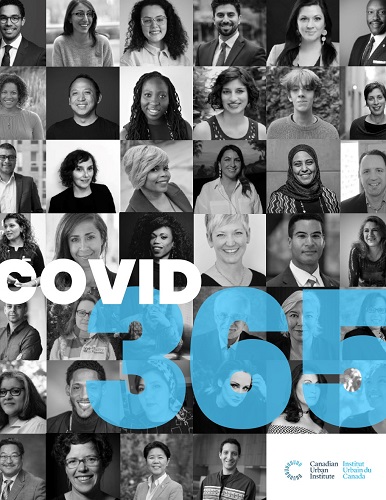 Sunday, April 28, 2024
Sunday, April 28, 2024  Sunday, April 28, 2024
Sunday, April 28, 2024 
A new report from the Canadian Urban Institute confirms that how Canadians experienced the impacts of COVID-19 throughout the past year depended very much on where they live, whether or not they have children, and whether they are racialized or white. COVID Signpost 365 provides a seminal report on the year since the World Health Organization declared a global pandemic, and illustrates that Canada’s 20 largest cities, home to 42 per cent of the population, were hit disproportionately experiencing 62 per cent of COVID cases and 64 per cent of deaths.
Drawn from public health data, community leaders and opinion research involving 180,000 Canadians over the past year, COVID Signpost 365 found the impact of the virus has profoundly shaped people’s attitudes and concerns about virtually every aspect of their lives, with racialized and lower income residents reporting far greater impacts virtually across the board. From personal finances, work and socialization, to travel, public transportation and the way we care for children and elderly family members, COVID-19 affected not only the way we live, but our perceptions and thoughts about the future.
Exploring aspects of COVID-19 that changed how we live, work, move, care and thrive, COVID Signpost 365 also reveals profound differences in how these changes were experienced depending on gender, age, people living with or without children and among racialized and lower income residents of Canada.
The report also compiles more than 100 examples of community leadership that emerged across the country, and reveals how Canada’s largest cities banded together to tackle their most pressing problems.
“Over the past year, COVID has wreaked havoc on our world. We have lost more than 22,000 Canadians, with more than 893,000 people sick with confirmed cases of the virus. For the lucky among us who did not contract COVID, the impacts have still been severe,” says Mary W. Rowe, President and CEO, Canadian Urban Institute. “For racialized communities, people living in poverty and others who already faced significant barriers in their lives, the COVID experience has been even more difficult. This report tells the story of the past year by sharing the thoughts and opinions of thousands of Canadians, and the inspiration provided through remarkable examples of local leadership. It closes a chapter on a year unlike any other and tells us just how much work we have to do to build back cities that are more just, equitable, livable and vibrant for everyone.”
“At a time when people needed to stay apart, communities came together,” says Kate Graham, Senior Fellow, Municipal Leadership, Canadian Urban Institute. “Sometimes leadership came from people in positions of power and from organizations built to serve. Sometimes it came from less expected places, where people like the remarkable leaders we spotlight in this report have stepped up far beyond their usual roles to help those around them.”
The Canadian Urban Institute has marked every 100 days since the pandemic was declared March 11, 2020 with the release of stories and data that captured unprecedented events in Canada’s response to this crisis. COVID Signpost 365 brings this chapter of reporting to a close and will serve as a springboard into further conversations and convening with city-builders on how these rapid shifts will shape our cities in future. It starts the conversation about how we embrace all the positive responses that emerged at the local level, the problems that remain, and how we can empower and help our cities build back better in the days ahead.
Read the report here.
Survey Data
Survey data was provided in-kind by Advanis, which proved invaluable in understanding the disproportionate impact of COVID-19 in racialized and marginalized communities. Advanis has collected results from 180,000 Canadians since March 2020 using a continuous survey via its Tell City Hall / Ma Ville Écoute program. Results are freely available as a public service at advanis.net/self-sponsored-studies.
New Platforms for Collaboration
The Canadian Urban Institute created several new platforms to connect local leaders and help communities come together around shared goals like restoring main streets and urban cores, securing the right to home, and building healthy communities. More than 75 CityTalk events brought together hundreds of municipal leaders, community activists, subject matter experts and residents to share solutions and problem solve together. CityWatch tracked emergency response measures put in place by local governments providing much-needed connectivity during a time of rapid transformation. And CityShare served as a crowd-sourced platform that houses resources, tools and stories from city builders and residents responding to COVID-19 with on-the-ground solutions.
About the Canadian Urban Institute
CUI is Canada’s Urban Institute. We are the national platform that houses the best in Canadian city-building – where policymakers, urban professionals, civic and business leaders, community activists and academics can learn, share and collaborate with one another from coast to coast to coast.